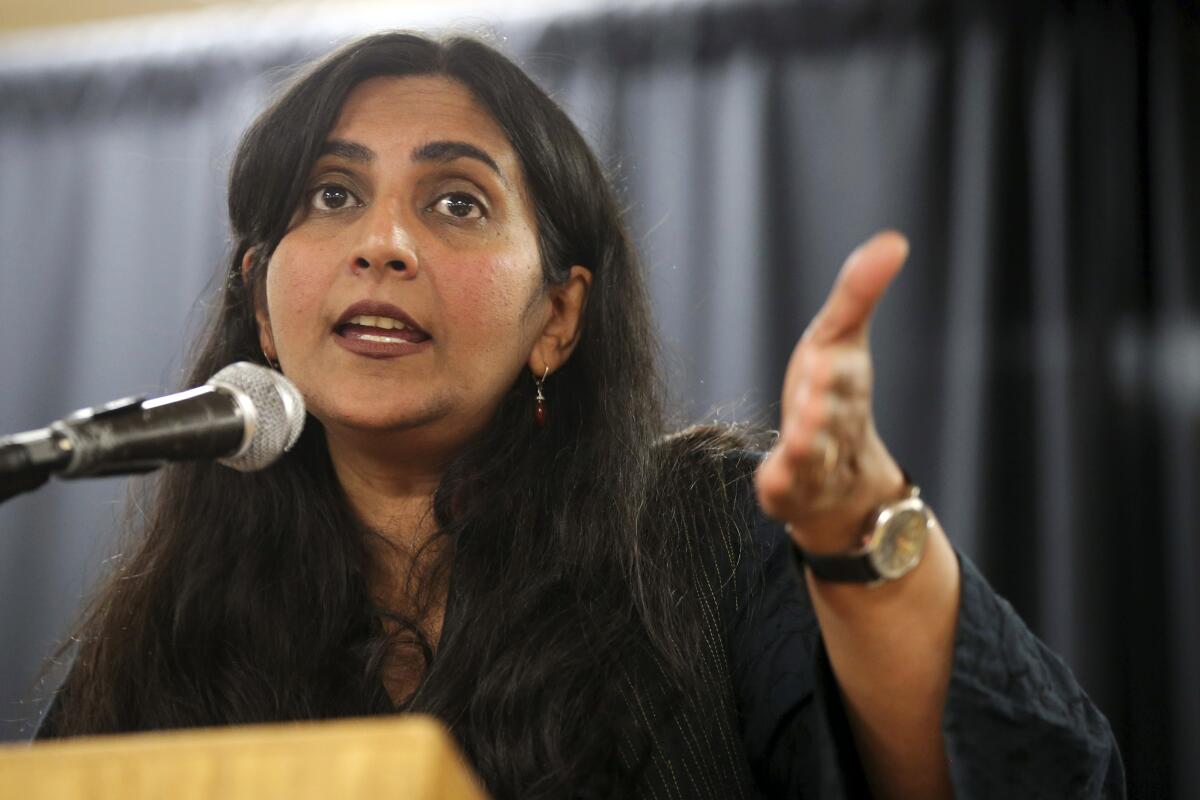Amazon’s big spending to defeat socialist Seattle City Council member fails to deliver

- Share via
SEATTLE — As a socialist on the Seattle City Council, Kshama Sawant may be the most powerful local foe of the city’s largest private employer, Amazon.
She helped pass a $15-an-hour minimum wage law that has cost the company dearly. She was also a staunch supporter of an ordinance to force large companies to pay a $275-per-employee annual “head tax” to fund public housing and homeless services.
The City Council passed that too, but then repealed it a month later. To the delight of her left-wing base, Sawant cast one of two dissenting votes and called Amazon Chief Executive Jeff Bezos “our enemy.”
Before last Tuesday’s city election, Amazon sought its revenge by pouring massive contributions into council races. But its efforts to support the business-friendly candidate running against Sawant apparently failed to deliver.
When voting ended Tuesday, small-business advocate and LGBTQ community leader Egan Orion held a small lead. But as mail-in ballots continued to be counted into the weekend, Sawant took over the lead, with 51.57% of the vote to Orion’s 47.95%, and she claimed victory at a news conference on Saturday. In 2013, Sawant overcame a 7-point initial margin to win her first two-year term.
Amazon, which employs about 50,000 people in the Seattle metro area, spent a record $1.5 million on City Council races through a political action committee managed by the Seattle Metropolitan Chamber of Commerce. It was the largest chunk of the more than $4 million that companies invested in the seven races.
The Seattle Times described Amazon’s spending as a “money bomb.”
Its impact remains to be seen. One possibility is that the spending backfired and stirred sympathy for targeted candidates. Even Orion said at his election night party that he was frustrated by “completely unnecessary” corporate donations, adding that if he won, he didn’t want “the shadow of Amazon” hanging over him.
Starbucks, another of the city’s corporate giants, exercised more subtle influence, donating far less money while voicing support for change on the nine-member council, said Joni Balter, a Seattle political analyst. On Monday, employees stood in front of outlets handing out free coffee in paper cups marked “Vote Nov. 5” as a company spokesman spoke to television reporters.

“They didn’t make it completely about money; they made it about coffee and ‘vote for change,’” Balter said. “It was a far more deft kind of PR move.”
Amazon is viewed warily by many Seattle residents, who see the corporate giant as a force behind the city’s rising cost of living and growing income inequality. The scale of the company’s sudden entrance into local politics is unprecedented, given its contributions of about $130,000 to City Council candidates in 2015.
Sawant, with scathing rhetoric and a doctorate in economics, frequently slams big business and its local and global influence, denouncing corporate greed and the national two-party system. In 2013, she campaigned on a pledge to raise the minimum wage, beating Richard Conlin, a four-term incumbent.
She helped make Seattle the first big city to adopt the $15-an-hour minimum, which Amazon extended to all of its employees nationwide. The “head tax” initiative she helped lead in 2017 would have cost Amazon more than $10 million a year.
As the legislation progressed, Amazon managers said they would halt plans for a new downtown building and reconsider another one under construction, jeopardizing 7,000 or more jobs.
Sawant endured humiliation when a rally she held outside company headquarters was crashed by iron workers in hard hats who drowned her out, shouting, “No head tax, no head tax!”
At her election night party Tuesday, Sawant said, “We are going to have to continue to fight to make sure every vote of disenfranchised people gets to count.”
More to Read
Sign up for Essential California
The most important California stories and recommendations in your inbox every morning.
You may occasionally receive promotional content from the Los Angeles Times.











